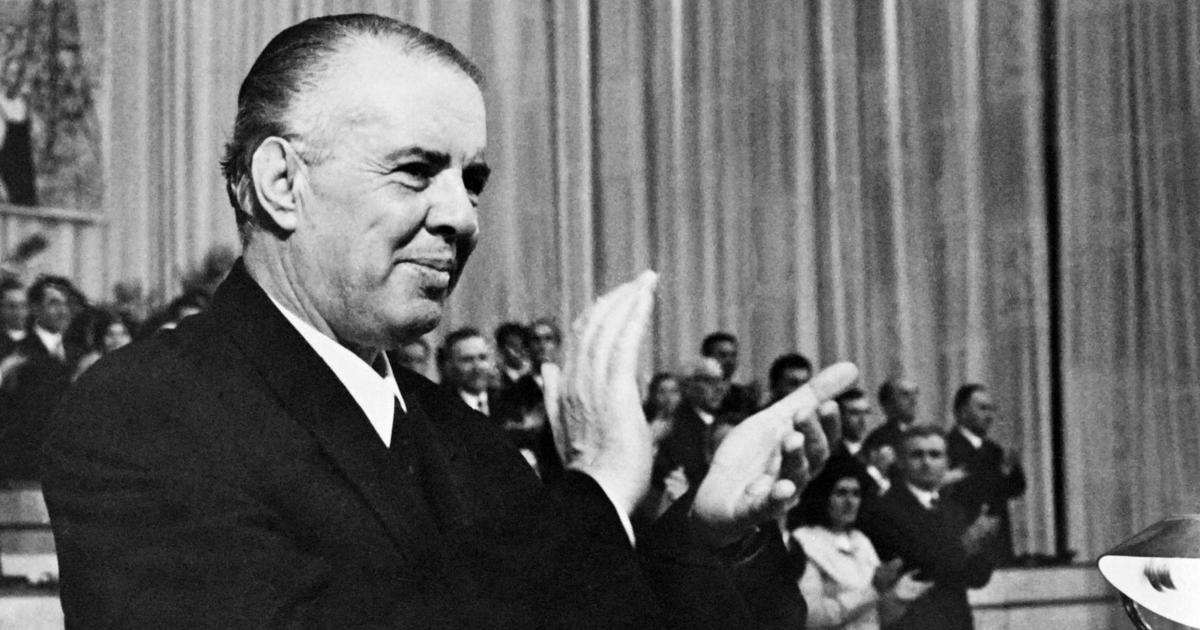Enlarge image
Fan protests in the Allianz Arena in Munich against the World Cup in Qatar: not everything has been achieved by a long shot
Photo:
MIS / IMAGO
Social progress has a peculiar quality: once it has happened, everyone suddenly feels as if everything has always been like this and that they themselves have always been in favor of it.
The sociologist Heinz-Herbert Noll, who specializes in measuring societal progress, once wrote: »Seen in retrospect, progress is therefore spoken of when current living conditions are viewed as an improvement compared to the past«.
Societal progress cannot be experienced equally by all people at all times.
But for those whom it currently affects personally, it is anything but abstract.
For those who are already better off, it may even be annoying, even threatening.
The gossip about the »degeneration of the people« – still in 1962
For example, if you lived as a gay man in Germany in 1968, you could be sentenced to several years in prison under Section 175 of the Criminal Code, which was copied exactly from the Nazi era.
Because of "fornication".
Up until 1969, 50,000 men were convicted on the basis of the Nazi paragraph in the beautiful, democratic Federal Republic of Germany that enjoyed the economic miracle.
Compensation for those affected has only been available since 2016.
Paragraph 175 fell in the GDR in 1968.
Gays and lesbians were nevertheless discriminated against and excluded
.
Still under Helmut Kohl
When negotiations began in the late 1950s to reform the penal code, the justification for a draft from the then CSU-led Ministry of Justice included the assessment that "same-sex indecency" continued "the degeneration of the people and the decline of its moral forces« threatened.
As is well known, under the Nazis tens of thousands of homosexuals ended up in concentration camps.
Not many survived.
The sentence just quoted comes from a Bundestag document from 1962.
Paragraph 175 continued to exist in the Federal Republic of Germany until 1994 in a version that has finally been weakened, but is still scandalous and characterized by resentment instead of facts.
Even under Helmut Kohl, the Union defended him with the absurd and anti-scientific justification that gays could otherwise distract young people from the supposedly right path.
The Role of “Public Religious Communities”
Against this background, it is all the more gratifying that the German public, thank football, is now so intensely interested in the rights of non-heterosexual people in Qatar.
The reactionary effect of Islam is often mentioned.
However, out of religious fanaticism, homosexuals were also suppressed and criminalized in this country long after the Second World War.
As late as 1957, the West German Federal Constitutional Court found that when interpreting the so-called moral law with regard to the criminal liability of homosexuality, it must be taken into account
»that the public religious communities, especially the two large Christian denominations, from whose teachings large parts of the people take the standards for their moral behavior, condemn homosexual fornication as immoral«.
more on the subject
Persecution of homosexuals in Germany: "I was put in solitary confinement because I'm gay"
Persecution of homosexuals in Germany: "Finally become a little man" by Lazar Backovic, Martin Jäschke and Sara Maria Manzo
Catholic Reform: Remarriage and same-sex marriage no longer lead to termination
Incidentally, these and many other stunning details can be found in a review of the LSVD that is well worth reading.
The verdict of 1957 also contains sentences about female sexuality that make one's hair stand on end today - and sentences about supposedly »biological« behavior and the »physical formation of the sexual organs«, which are still the same today when it comes to trans people hear.
Fanatical theocracy
From the point of view of gay and lesbian people, the young Federal Republic was a fanatical, repressive theocracy.
From that of trans people too, of course, but there was no talk of them at the time.
Knowing our own extremely inglorious story on the matter helps to understand why, for many LGBTQ people, whether the national team captain wears a certain armband or not is of such importance.
A process, not an event
Now progress is not an event but a process.
Ideally, he keeps going.
German politicians, who are now proud that the German Minister of the Interior wore the One Love armband into the stadium, have quickly and silently incorporated the social progress that has already taken place into their image of Germany.
And yet in 2017, 225 MPs from the Union parties voted against equality for same-sex marriages.
The AfD continues to reject marriage for everyone and wants to abolish it again, but was not in the Bundestag in 2017.
Some people always go too fast or too far
But the Bavarian state government and many members of the Union were also keen to take legal action against »marriage for all«.
They only decided against it when experts came to the conclusion in 2018 that such a lawsuit would be futile.
That was only four years ago.
Now CSU boss Markus Söder is "concerned and outraged about the critical human rights situation in Qatar" and about the "homophobia" that Qatar's World Cup ambassador expressed "quite openly".
What you "shouldn't say anymore"
Of course, open homophobia also exists in Germany to this day, but now you can get into trouble if you act out too publicly, especially as a politician.
And when this anger arises, certain circles get upset that one shouldn't "say any more" so much.
That was the case, for example, when Friedrich Merz moved homosexuals close to pedophiles in good Union tradition in 2020.
Merz reacted to the anger that this rightly caused with a pseudo-apology – and in the same breath complained about the “outrage machine” that his naturally intentionally outrageous statement had set in motion.
This is how the perpetrator becomes the victim.
"So that nonsense doesn't become fashionable"
The fight for a world in which everyone is treated equally, regardless of gender identity or sexual orientation, is far from over.
There are social groups that continue to bitterly fight progress.
more on the subject
Perversion of a term: freedom or wokeA column by Christian Stöcker
Sobering climate conference COP27: The saboteurs act in the backgroundA column by Christian Stöcker
Climate Conference COP27: We can save ourselves by paying finesA column by Christian Stöcker
In hindsight, the same people often end up finding progress perfectly okay, albeit massively delayed.
The merger of lesbian and gay people in the Union, for example, was recognized as an official party organization, a so-called »special organization« just over two months ago.
Just over twenty years earlier, the former legal policy spokesman for the Union faction, the arch-Catholic Norbert Geis (CSU), had declared in writing that "the public should not get the impression (...) that it is right for young people to decide on such a way of life «.
Homosexuality is a "perversion" against which "an objection must be made so that the nonsense does not become fashionable".
Geis sat in the Bundestag until 2013.
And now against »woke«
It is against this background that one has to see the continuing defensive struggles, the culture-fighting attacks on »Wokeness«, »Gender-Gaga« and so on: On the one hand, to proudly puff one's chest out because one is now really showing the backwoods Qataris of the World Cup, while in this country at the same time fighting against the next steps towards real anti-discrimination by making up swear words for it, is as self-exposing as it is hypocritical.
It's an election campaign with resentment as an offer, nothing more.
In the meantime, people have become a little more cautious and act as if they are not against the concerns themselves - but only against all suggestions for improvement and those who bring them up.
First rejected, then incorporated
advertisement
Christian Stoecker
We are the experiment
Publisher: Karl Blessing
Number of pages: 384
Publisher: Karl Blessing
Number of pages: 384
Buy for €22.00
price query time
11/27/2022 12:11 p.m
No guarantee
Order from Amazon
Order from Thalia
Order from Yourbook
Product reviews are purely editorial and independent.
Via the so-called affiliate links above, we usually receive a commission from the retailer when you make a purchase.
More information here
Like many of his Union colleagues, Markus Söder, who is now condemning homophobia, has no problem dismissing the ongoing fight against discrimination as dangerous »wokeness« and »gender gaga«.
At the same time, he and his ilk are happy to incorporate the victories made by others in this struggle.
It is good and right that the debate about armbands and rainbow flags in Qatar draws attention to the fact that discrimination is still part of everyday life in many places.
But that should not lead to the completely erroneous assumption that everything has already been achieved in this country.
Even if those who in truth continue to reject social progress would like to pretend to be.





/cloudfront-eu-central-1.images.arcpublishing.com/prisa/4U7HLSIMWA6CLQVYFOXLZTUFYU.jpg)









